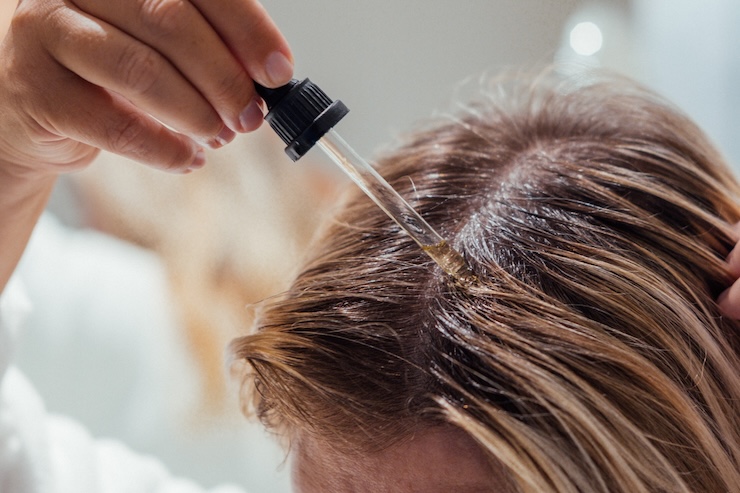While it’s probably pretty rare to have hair so long someone can climb it, it’s certainly not out of the ordinary to wish for Rapunzel-like locks.
Whether you’re growing out a short haircut, noticing some balding patches, or trying to manage heat damage, there are tons of reasons to hope desperately for long, luscious tresses.
Luckily, there’s an ingredient out there that has quite a few impressive benefits for the hair, and it happens to be rosemary oil.
When used correctly, rosemary oil can help with hair growth and strengthen the hair follicles. But can you sleep with rosemary oil in your hair?
Keep reading to find out everything you need to know about using rosemary oil in your hair overnight.

What is rosemary oil?
At its heart, rosemary is an evergreen shrub native to the Mediterranean region and is also known as Rosmarinus officinalis. Rosemary has needle-like leaves and thrives in warmer and drier climates.
To create rosemary essential oil, it’s extracted from the plant’s flowering tops, leaves, and stalks, and then bottled to deliver a host of hair and health benefits.
What are the benefits of using rosemary oil on the hair?
“There are a couple of different aspects to rosemary that are extremely beneficial,” says William Gaunitz, a certified trichologist and founder of Advanced Trichology.
He breaks down three of those benefits here:
It promotes microcirculation
“Rosemary allows for a greater capacity of blood flow to the individual hair follicle,” Gaunitz says. “There was a study done comparing it to 2% minoxidil, where it did seem to create better results than 2% minoxidil used twice daily.”
What does this mean for your hair? By improving blood circulation, the follicles get the nutrients they need, in turn helping hair grow. Talk about a win-win.
It has antimicrobial benefits
“Rosemary oil is antimicrobial, which will decrease or eliminate negative bacteria, fungi, and parasites living on and around the hair follicle,” says Gaunitz. “This will allow for improved growth as the hair will have a greater nutrient supply and less inflammation.”
It has anti-inflammatory benefits
If you suffer from an itchy or irritated scalp, you may want to try out rosemary oil. “Rosemary oil does seem to have anti-inflammatory benefits, not only from being microbial but also topically,” Gaunitz says.
Since rosemary essential oil helps boost anti-inflammatory properties, it’s worth trying to reduce irritation. Additionally, rosemary oil may help prevent premature graying and treat dandruff.

Can you sleep with rosemary oil in your hair?
Rosemary oil certainly has quite a few benefits for the hair and scalp. We have a feeling you’re asking, “Well, can I leave rosemary oil in my hair overnight?” The short answer is, yes and no.
Here’s the longer answer: Because rosemary oil is a very potent essential oil, you actually shouldn’t use it on the scalp for long periods of time.
Gaunitz recommends diluting it with a carrier oil—like coconut oil or jojoba oil—to avoid skin irritation. “Using undiluted rosemary oil directly on the scalp overnight could result in irritation, such as contact dermatitis, and certainly could disrupt the scalp microbiome,” he cautions.
However, if you do dilute rosemary oil with a carrier oil or alcohol, Gaunitz says applying it to your scalp and leaving it on overnight will work just fine. “In this case, it certainly can be left on overnight and washed out in the morning,” he says.
If you’re worried about skin irritation, you can still use rosemary oil on the hair—just do it for a shorter period of time. Try it for around 30 minutes, then wash your hair before getting into bed for the night.
How to apply rosemary oil for overnight treatment
If you’re going to apply rosemary oil in your hair overnight, be sure to follow precautions so you don’t irritate your scalp.
“For maximum benefits, mix rosemary oil with a minoxidil solution,” Gaunitz recommends. “This acts as a perfect carrier for rosemary oil, and you can simply add pure rosemary oil directly to your minoxidil container and shake it up.”
Tip 1: Mix into a carrier oil
A little rosemary oil goes a long way. Mix a few drops into your preferred carrier, then massage into the scalp. Leave it for at least 30 minutes.
If you do decide to sleep with rosemary oil in your hair, you can protect your pillowcase by sleeping in a shower cap or hair wrap.
Tip 2: Mix into shampoo or conditioner
If you’re wary of sleeping with rosemary oil in your hair, you can also get its benefits by mixing it into shampoo or conditioner. Just make sure you rinse your hair thoroughly after using.
FAQs
How often should you use rosemary oil in your hair?
Depending on how sensitive your scalp is, you can use rosemary oil in your hair every night—although it’s better to start with once or twice a week and build up to more frequent application. “I do recommend using diluted rosemary oil nightly,” Gaunitz says.
Can rosemary oil cause hair damage?
It’s actually possible to cause hair damage by using rosemary oil. However, that comes from over-using it and applying it too often. If you do, you can cause damage to the hair follicles and scalp.
Can rosemary oil help with hair growth?
Rosemary oil can certainly help with hair growth. In fact, a 2015 study on people with androgenic alopecia found that after six months of consistent use, rosemary oil was as effective as a popular hair growth treatment at increasing hair count.
However, keep in mind that it’s not a one-and-done solution. “Rosemary oil can help with hair growth, but I do believe it is not a primary active ingredient,” Gaunitz says. “It is best to combine with other treatment elements to complement different modalities, like minoxidil or DHT [dihydrotestosterone]-blocking herbs, to get the best results possible daily.”
What’s the best way to sleep on your hair? Here’s how to protect your hair overnight.




